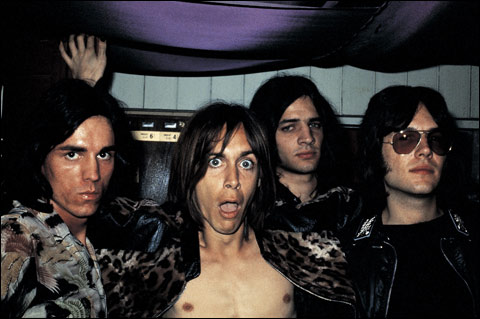
WORLD’S FORGOTTEN BOYS: Millions now bow to Raw Power’s majesty, but in 1973, it and the Stooges were considered a flop. |
It’s hard to fathom now, when their music has achieved such godhead status, but in 1971, Ann Arbor’s legendary Stooges had dissolved in ignominy, dropped by Elektra after the seemingly indulgent commercial failure that was 1970’s howling
Fun House. Ron Asheton (canonized by
Rolling Stone shortly before his passing in 2009 as #29 on their list of the 100 Greatest Guitarists of All Time) and his drumming brother Scott languished at home. The new second guitarist, James Williamson, was back in Detroit, marveling at his brief foray with the late band. And ringleader Iggy Pop was in New York, hustling for a solo record deal.
What happened next is rock scripture: Pop, with the backing of some new rock superstar named David Bowie, would convene a slightly reconfigured Stooges to record a third album that would atomize even their previous two earthshakers. It is immaterial that the album failed to get noticed outside of an enlightened few, even though its failure led swiftly to the Stooges’ demise. Its legend has mushroomed since, and millions now bow to the altar of Raw Power majesty.
When I spoke to Williamson over the phone, on the eve of the reunited Stooges’ tour (it comes to the House of Blues on Tuesday) to celebrate that 1973 disc in all its glory, I was expecting him to view the triumph of the record as bittersweet, given that it was so unheralded in its day and was created amid such turmoil. I was wrong.
“No no no, ‘bittersweet’ is not a word that I would use at all,” he says. “I think that, in fact, we all thought that time was very sweet. We were working, we had a record deal, and so I see those times as being very special.”
It was a particularly special time for Williamson: when Pop got a record contract (CBS) and a management deal (Bowie’s MainMan), he took Williamson with him to England to draft a new rhythm section. They auditioned scores of foppish glammed-out rockers, but Williamson wasn’t impressed. “You really can’t play music that’s any good with people you don’t like. That’s just a fact! Everyone in those days was all flowery shirts and poofy frilly hair and all, and I just couldn’t relate to these guys. Iggy may have seen it differently, but in the end, I said to him, ‘You know, I think we oughtta just call up Ron and Scott’ — and he didn’t disagree.”
The Asheton brothers were enthusiastic, but they had to adjust to the new rules: Ron Asheton moved from guitar to bass, and this time out, Iggy was the star. Williamson views the whole thing pragmatically: “You know, the fact is that Iggy has always been a dynamic performer. And whoever was managing us, or whoever the record company was, they always wanted to make Iggy a star, and the band was secondary. Luckily, Iggy never looked at it that way, at least not during Raw Power.”